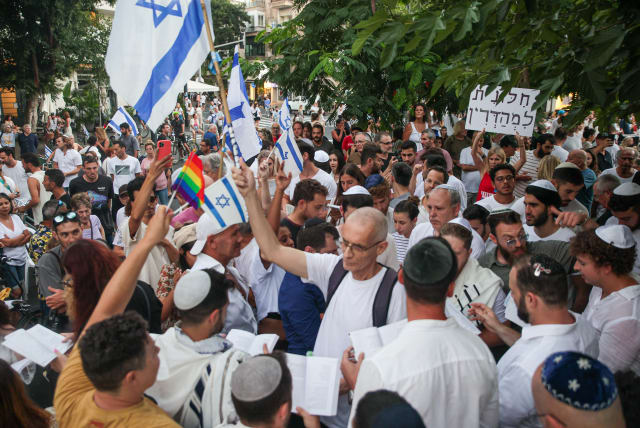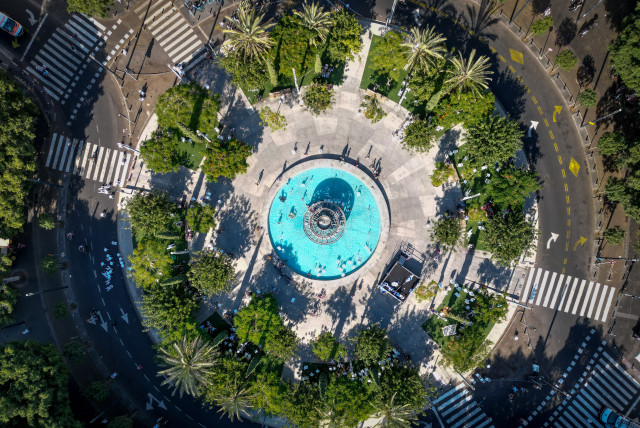Yom Kippur violence: Disunity is the biggest threat to Israel - editorial

Israel is today a land of mutual suspicion, where every action – even the most innocent – is seen as presaging greater malevolence lurking just around the corner.
Last year, the spectacle of thousands of Jews of all stripes – religious and secular, Ashkenazi and Mizrahi, young and old, Right and Left – participating in Yom Kippur’s closing Ne’ila service together in Tel Aviv’s Dizengoff Square instilled a sense of hope.
Amid the fifth extremely divisive election campaign in under four years, that mass prayer gathering in the heart of Tel Aviv illustrated that the unity within the nation remained stronger than its divisions.
This year, the spectacle in Dizengoff Square on Yom Kippur evoked a deep sense of sadness: Jews tussling with each other during the opening Kol Nidre service; protesters hollering “shame, shame” as the service unfolded; organizers erecting a gender-separating mechitza (partition) despite a court order that they not do so; protesters taking it upon themselves to remove the partitions by force; young women weeping at the sight of it all.
Here stood the Children of Israel, on the holiest day of the Jewish calendar – a day marked by repeated pleas for a year free of “baseless hatred” – fighting among themselves in a frightful demonstration that what divides them is clouding their thinking.
Were they thinking, or thinking clearly, none of this would have happened.
Were they thinking, the Tel Aviv municipality would not have barred the placement of a temporary partition on Yom Kippur in a public space to accommodate those desiring a gender-separated area for prayer, while allowing others to pray alongside their families and friends.
Were they thinking, the organizers – well aware of the super-polarized atmosphere in the country – would not have attempted to erect a partition, even if it had been composed of flags and did not look like partitions typically seen in Orthodox synagogues separating men and women.
Why, one must ask, did a prayer service that has taken place annually, without incident since the onset of the coronavirus, turn so ugly this year? Why was there no uproar last year, or the year before, when a partition was rolled out for the prayers?
The reason lies not in the mechitza, but goes much deeper and is related to fears and beliefs. It is the fear among the ardently secular that their way of life is endangered. It is the belief among the ardently religious that vaunted liberal values – “live and let live” – apply to everyone but them.
In Israel 2023, everything is considered too important to compromise over
There was a time when this type of prayer service, just like refraining from eating hametz on Passover in a hospital, did not necessitate state intervention; when it did not require legislation; when it could all be managed with common sense, mutual respect, and basic decency.
There was a time when issues such as these were governed by the simple understanding that if I know something bothers you, I won’t intentionally provoke you by doing it in your face. I’ll respect you, as I expect you to respect me.
A collapse of mutual respect emerged on Yom Kippur in Dizengoff Square. In Israel, circa 2023, everything is considered a “slippery slope,” everything is a matter of principle over which it is impossible to compromise.
Why? Because of the feeling that if one compromises, there is no limit to what may follow next. Instead of mutual respect, Israel is today a land of mutual suspicion, where every action – even the most innocent – is seen as presaging greater malevolence lurking just around the corner.
The situation is exacerbated by political leaders who, rather than trying to bridge gaps or rein in the extremists within their respective camps, only make things worse with statements designed not to lead, but rather to gain raucous applause within their own echo chambers.
“Those who pour fuel onto this fire are a real threat to Israeli unity,” President Isaac Herzog said on Tuesday. “It has to stop here and now. The division, the polarization, the never-ending disputes – they are a real danger to Israeli society and the security of the State of Israel.”
Herzog is right, as he has been for months about the need for compromise over judicial reform. The problem is no one is listening to him.
We implore everyone, first and foremost the nation’s leaders, to heed Herzog’s message and view Sunday night’s ugly scenes in Dizengoff Square as an urgent wake-up call.
Jerusalem Post Store
`; document.getElementById("linkPremium").innerHTML = cont; var divWithLink = document.getElementById("premium-link"); if (divWithLink !== null && divWithLink !== 'undefined') { divWithLink.style.border = "solid 1px #cb0f3e"; divWithLink.style.textAlign = "center"; divWithLink.style.marginBottom = "15px"; divWithLink.style.marginTop = "15px"; divWithLink.style.width = "100%"; divWithLink.style.backgroundColor = "#122952"; divWithLink.style.color = "#ffffff"; divWithLink.style.lineHeight = "1.5"; } } (function (v, i) { });

